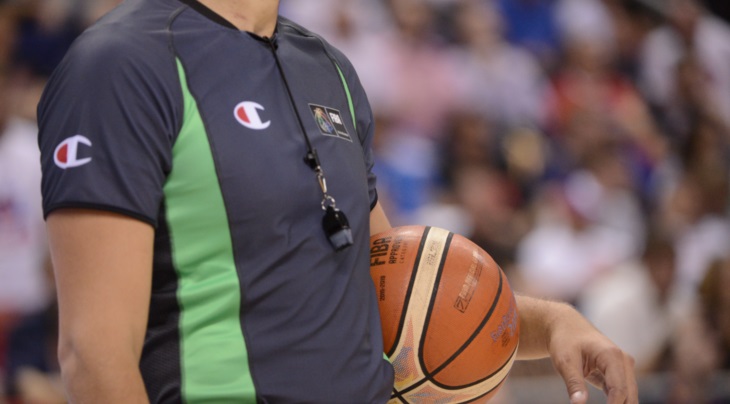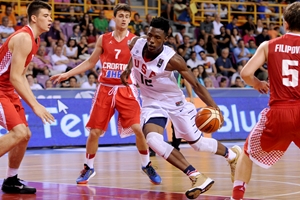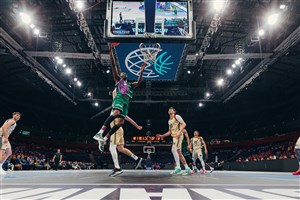
Common sense prevails, now structural change
MELBOURNE (Paulo Kennedy’s View from Downunder) - It could have been the most shambolic week in NBL history, and it certainly presented the first genuine public test for the league’s new management.
From Brian Conklin’s collision with Damian Martin, to some fiery press conference comments, to Josh Childress’ altercation with the refs post-game in Adelaide to the embarrassing and unacceptable refereeing errors which decided the Melbourne v New Zealand clash.
@NBL that is horrible. You need to do something about that! #TERRIBLE
— Joe Ingles (@Joeingles7) November 8, 2015
The good news is the league handled them all well, showing the maturity that has often been lacking in the past when controversial situations arose.
For those who missed it, two of the referees involved in the Breakers v United debacle – Raoul Kirsten, Matt Townsend and Tim Brown were the three officials - were stood down, and the league has now made video review available for any incident in the final two minutes.
I was going to go into those disastrous few moments in more detail, but I think the NBL’s quick and thorough response has negated the need.
It was in stark contrast to the silence from the NBL when referee Tim Mills rewarded this infamous Patty Mills flop in 2011.
If you do feel like watching what happened, this video has amplified the audio from the referees’ microphones.
Getting consistency
For me though, this incident is a perfect time to look at the broader picture, and that’s the overall refereeing structure in the NBL and Downunder as a whole.
This is extremely important with the NBL trying to make ground as an entertainment product, and the new FIBA calendar requiring high-level officials to be ready to go during World Cup qualifying windows throughout the year.
Let’s start by looking at Tim Brown’s decision to award an offensive foul against Corey Webster, where consensus is Chris Goulding clearly sold minimal contact with a dive.
This goes back to the charge/block situation I wrote about two weeks ago.
Former refs boss Peter Carey, who was in control until the NBL demerged from Basketball Australia, reportedly instructed refs to call doubtful charge/blocks in favour of the defence.
His replacement, Mal Cooper, preached that doubtful calls should go in favour of the offence, while the latest man in the job, Alby Joseph, just wants refs to call each as they see it.
No wonder there is confusion!
Joseph's overall approach is working well in some areas, but in other areas - for example, having a large reffing panel full of differing abilities and experience making multiple judgement calls on doubtful charge/block situations every game - just lends itself to inconsistency.
Joseph’s approach relies on education and feedback bringing the panel into line. However, with such variation in the ranks, and all referees part-time, how long will that take?
For mine, the only way to improve consistency is to reduce the size of the panel.
When I look at some of the howlers of recent times, and bad calls made week-in, week-out, I often see experienced mid-level refs in charge.
Now these referees are obviously good enough to be on the current panel, they have maintained their position for years.
However, is the development of refereeing in this country best served by maintaining experienced referees who have peaked well below the elite level?
Full-time elites?
Officials who make basic errors aren’t what FIBA needs for important World Cup qualifiers, and their lack of consistency doesn’t help the NBL to be a viewer-friendly product.
Is it time to give serious consideration to a small panel of full-time referees, made up only of our best whistle-blowers?
With the NBL now played five days a week, along with the WNBL, FIBA games year round, SEABL and national championships in the off-season, and the need for mentoring of younger referees, there is sufficient work to support such a panel.
The gaps around the full-time referees would be filled from a part-time panel, similar to the current model but smaller, and featuring the best emerging referees, providing a pathway from the lower ranks to the professional level.
As they gain more experience over the years, the best of these refs could fill gaps in the full-time panel, or add to it if further funds became available.
Those who don’t reach that standard are moved on once they have passed their peak. That’s the way it is for athletes, officiating shouldn’t be any different. Only the best survive long term.
What this structure does is reward high performance, puts a focus on constantly developing the next generation, and creates a genuine pathway for officials.
It could also create a much stronger relationship between our reffing elite and those looking to achieve those heights, and provide strong, consistent role modelling rather than the mix we have now.
If the best emerging refs are regularly calling NBL games alongside two highly-capable professionals it will no doubt improve their development. Michael Aylen, Brad Giersch and Chris Reid refereeing tonight’s New Zealand v Perth game brought a real level of maturity to it.
NBL Round 6 New Zealand Breakers vs. Perth Wildcats Highlights #HardBall @NZBreakers @PerthWildcats https://t.co/7ktLpdyuou
— NBL (@NBL) November 13, 2015
Let’s get together
I believe it’s time for the NBL, Basketball Australia and Basketball New Zealand to get together and assess the money they are spending on officiating.
Are they getting bang for buck, or has little progress really been made? Are the best officials rewarded for their high level of performance, or is the pie spread too thin?
Would the same or similar amount of money achieve more if it were centralised on the best referees, involving them in all levels of the sport to help improve the standard of officiating across the board?
And will it help Australia and New Zealand better prepare referees to step into international competition and perform well, especially in the post-2017 calendar?
It’s often said the level of refereeing is below the standard of play in the NBL, and there is a simple reason for that. Australian basketball players became fully professional in the 1990s, meaning officiating has been slowly falling off the pace for around two decades.
It could take some time to implement a new structure, so now’s the time to get innovative and find a solution that makes our elite referees full-time, whether based on my suggestion or something else.
Paulo Kennedy
FIBA
FIBA's columnists write on a wide range of topics relating to basketball that are of interest to them. The opinions they express are their own and in no way reflect those of FIBA.
FIBA takes no responsibility and gives no guarantees, warranties or representations, implied or otherwise, for the content or accuracy of the content and opinion expressed in the above article.

















